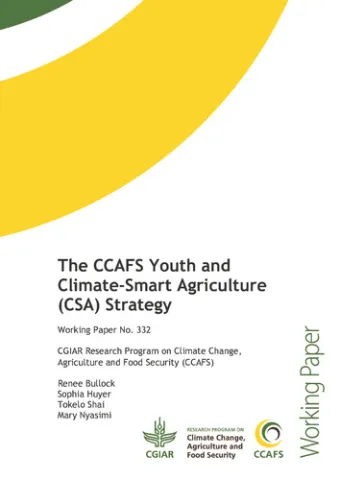The CCAFS Youth and Climate-Smart Agriculture (CSA) Strategy

Abstract
The CGIAR Research Program on Climate Change, Agriculture and Food Security (CCAFS) Youth Strategy is intended to guide strategic research on youth, support youth development initiatives across CCAFS Flagships and regions, and target and equip youth with knowledge on climate-smart agriculture (CSA) practices and technologies to increase productivity, resilience, and employment opportunities (CCAFS, 2016). This Strategy will ensure that CCAFS is well aligned with the urgent need to address youth issues globally, including young women’s and men’s participation in, and potential to benefit from, CSA.
The Youth Strategy is interwoven with the CCAFS Gender and Social Inclusion (GSI) Strategy (Huyer et al., 2016). It is integrated into activities across CCAFS and is an important aspect of scaling up CSA. CCAFS is also committed to targeting youth separately from gender-related activities through strategic research across FPs and regions.
The Strategy advocates for approaches that build the agency of youth to navigate and negotiate opportunities for more sustainable futures. To understand youth, broader geographic characteristics that influence local opportunities for employment, including improving productivity, adaptive capacities, and youth migration, must be documented. While structural and rural transformation will interact with conditions for CSA initiatives, social factors must be equally considered for their inter-relation with youth’s agency to pursue CSA options, based in their own priorities and abilities. Socially inclusive and intersectional approaches provide a better understanding of the ways in which local and cultural contexts structure young people’s opportunities and challenges in CSA. In addition, young people’s relationships within families influence agency, particularly for those who are economically dependent upon their parents. The social networks that youth are embedded in often mediate agency and their ability to secure resources, both of which will be important to support their ability to kickstart, participate in, and benefit from CSA initiatives.
Entry points for working with youth include information and communication technologies (ICTs), digital technologies, value chain approaches, collective action, and social platforms. Value chain approaches will be essential to simultaneously address finance and resource gaps while supporting the potential for employment and climate change adaptation. The collective agency of youth, whether through groups or virtual networks, is also important for knowledge exchange and to build social capital, which can promote agency.
